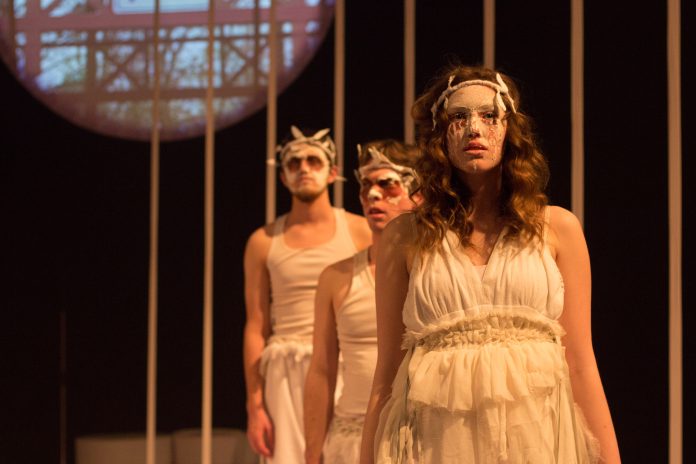Bakkhai was written by Canadian Anne Carson and brought to the stage by the UFV theatre program. It’s the story of Dionysus, a demigod, who has come to the city Thebes to punish Agave and her sisters for disbelieving in his divinity.
Dionysus descends upon Thebes, he is motivated to teach the city a lesson; he seeks revenge. He’s furious that the city, and especially his aunts, don’t believe that he is a god. And to prove that he is, and that he’s the son of Zeus, he exercises his dominance through madness.
But Bakkhai is about more than a god’s vengeance. Directed by theatre instructor Raïna Von Waldenburg and theatre student Reilly Ellis, the play stretches all aspects of civility and social order to the point of being unrecognizable.
Dionysus contorts the boundaries of comfort. He brings a new religion, a new system of blurred boundaries and sensual convictions into the tidy city of Thebes. In this play, the ideas of social boundaries are laughed at by the demigod.
Pentheus, (Erich Petkau), is the son of Agave (Natasha Purnell) and half cousin of Dionysus (both Delaney Bergstrom and Steven Bowman). Pentheus represents the orderly and the civilized. He is the king of Thebes — he is the king of rigidity and structure and has banned worship of Dionysus.
But Dionysus is the god of wine, of pleasure, of theatre. He is also wrathful. His revenge? He drives the city mad in lust, infidelity, and primal instinct.
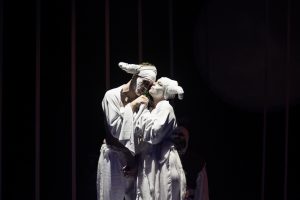
The rationale behind casting two people to play Dionysus at once is to expose the non-binary nature of the god.
“It’s sort of like a piece of jazz music, it’s playing with each other and off of each other so there are moments when it perfectly flows together then there are moments of sharp contrast in the ways of things,” said Bergstrom.
“The dynamic that our personalities have as individuals really shows up in our performances as well,” Bowman added.
The play also features Eli Moores as Teirsesias and Desiree Hale as Kadmos. The Bakkhai, this play’s chorus, are played by Brad Bishop, James Sloggett, Daniel Emily Eggert-Botkin, Houston-McMillan, Trudy-Bridgette Smith, Makailla Palliyaguru.
This rendition of the play is play notably poetic. There’s an organic expression that comes from the truly raw, experiential delivery.
The production takes physical movement experimentation to the extreme and is very demanding on the actors. The concept of binary and reshaping social constructs is woven throughout the play, displayed by the extensive contortions of the actors. Much of the conditioning for this show involved extensive yoga sessions and strength exercises.
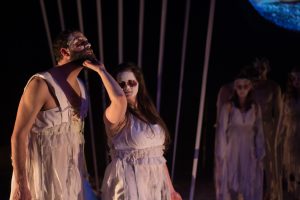
What’s more is the actors have been encouraged to avoid acting. Instead, Von Waldenburg led them to be themselves on stage.
“Every person in the play plays their own individuality in the show,” said Gagnon. “So it’s not that we’ve cast somebody and said we want you to play this character like this, the directors have cast such a person because they have seen something within them that they want to see on the stage.”
“What I didn’t want to do as a director is create the great drama, because I hate that shit,” said Von Waldenburg. “And so I thought to myself, okay how do we get around that? Then I thought the worst thing to do would have been to cast the actors and tell them who to play as or tell them to do their character homework and to become those characters.”
“So these Bakkhai, all of the little quirks that we have — some people have twitches, some people have certain postures, all of that you see in this. Everybody plays with their own individuality in this as well,” said Gagnon.
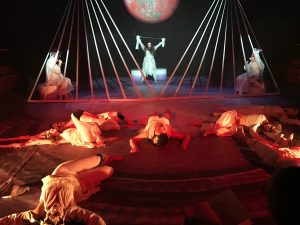
The set was designed by assistant professor Parjad Sharifi, who is a scenographer and award winning light designer.
Even the set was built to be fluid and elastic. It is minimalistic but expansive. Two walls that swivel, made of white elastic bands create the height and width of the set. Four pylons make up everything else that the characters need to work with.
There’s a strong sense of symmetry within the set, but it’s constantly reshaped and contorted throughout the show.
“There are so many great examples of how the actors use the set as an extra limb and display really huge paintings of symmetry and then completely mash it up and making something new out of it,” said Ellis.
In addition to the physical structures, elaborate projections decorate the set.
The show’s makeup designer is Mhairi McKay give the characters dark, red eyes, and other-worldly white faces.
This will be the UFV theatre’s final production at UFV’s Chilliwack North campus, the last to be shown before the program will move to the Abbotsford campus in September. Von Waldenburg said that had a major influence on the direction of the play.
“There’s the side of us that’s rational and containing — building and developing, and crushing this theatre down, it’s about that side of us,” said Von Waldenburg. “And the other side is about impulse and instinct and subconscious and the fricken pelvis and pleasure.”
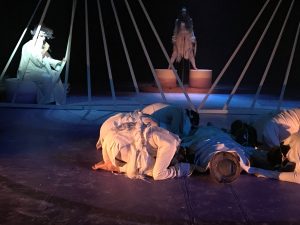
Bakkhai will run March 9–19 in the UFV performance theatre at the Chilliwack North campus with showtimes Thursday–Saturday, 7:30 pm; Sunday matinees at 2 pm. Tickets are $15 for regular admission; $10 students and seniors. Tickets can be purchased online at ufv.ca/plays.

